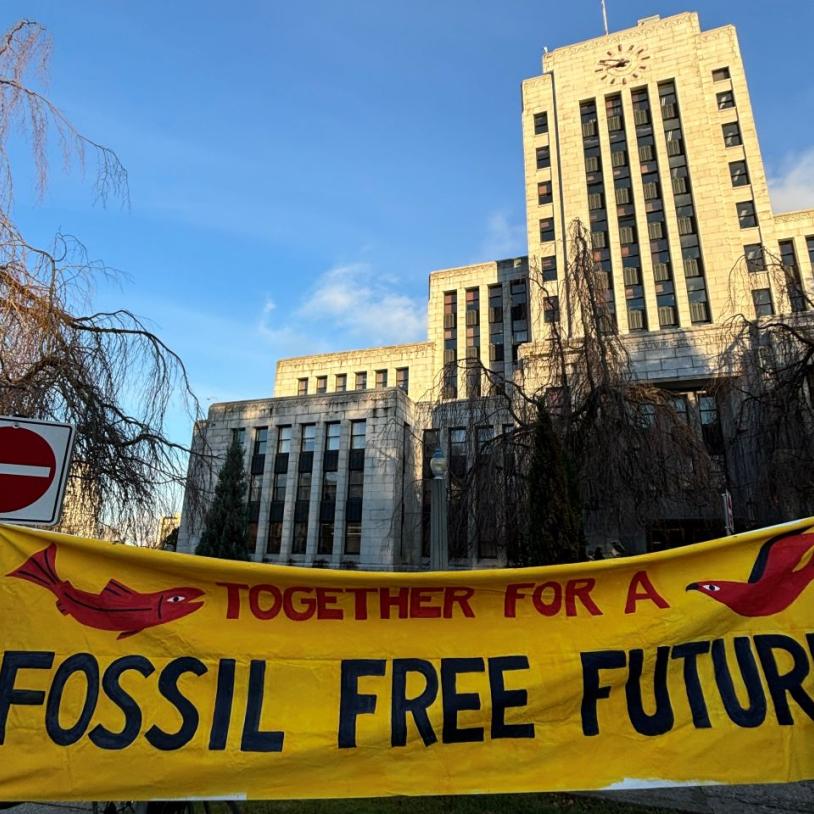Martyn Brown: B.C. will not be bullied by Big Business and Big Oil
Monday, April 16, 2018
Surprise, surprise. The Business Council of British Columbia has now come out swinging against the NDP government’s laudable new actions to protect B.C.’s environment.
Predictably, that mouthpiece for Big Business and Big Oil is slagging the government for supposedly "harming the Canadian economy and casting doubt on existing regulatory structures that have contributed to the responsible and sustainable development of our nation’s natural resources".
That, from an entity and oil and gas sector that has repeatedly shot itself in the foot because of its preposterous support of existing regulatory structures that invited a firestorm of legitimate public criticism because of their flaws and institutional biases.
A regulatory regime that is itself now the subject of a Federal Court challenge, in part, because of how it failed its purpose and has given Canada a black eye for all it has done wrong.
“Responsible” and “sustainable development”? Are you kidding me?
That, from the champions of unsustainable energy practices that are polluting our global atmosphere and destroying our planet—as NASA has helpfully illuminated and as the Intergovernmental Panel on Climate Change has so thoroughly documented?
There is nothing either “responsible” or “sustainable” about oilsands development, or the transportation of diluted bitumen that threatens so much life hanging in the balance.
There is nothing responsible at all about the morally corrupt and woefully inadequate National Energy Board approval process that the Harper government foisted on British Columbians and all Canadians. Specifically, to ram through oil and gas pipelines across our country, which are widely and vehemently opposed by so many of their “host” communities.
Responsible? Seriously?
Check out this handy list of incidents that the Wilderness Committee has posted. It shines a light on some of Kinder Morgan’s recent spills and accidents. You decide if they reflect responsible behaviours and adequate regulatory protection.
It is precisely those types of problems, and others anticipated by heavy oil exports, that require new regulatory guidance and enforcement, with proper safeguards for our environment and adequate redress for the communities, people, and amenities they impact.
Hence my earlier article in the Straight.
It is about bloody time we had a government with the gumption and good sense to revisit the bankrupt regulatory processes that have allowed companies like Kinder Morgan to get as far as they have in imposing their unwelcome projects on all of us who reject their vision.
Of whom there are plenty. Possibly a majority of Canadians.
Good on the Horgan government, we say, for doing what it promised and finally—finally—putting public interest ahead of private interest.
We should all applaud that government for acting with unprecedented resolve: to put science ahead of corporate greed; Aboriginal rights and title ahead of Big Oil’s vested interests; community concerns ahead of shareholders’ pocketbooks; and our environment ahead of an economic model predicated on environmental destruction.

Tomorrow (January 31), the David Suzuki Foundation will be releasing a report entitled “Fugitives in Our Midst”. It will address the true extent and impact of B.C.’s oil and gas sector methane emissions, which have been sorely understated. They demand urgent attention.
That report builds on the foundation’s previous damning analysis of the industry’s “fugitive methane emissions”. It adds yet another timely element to the debate on Canada’s ultimate ‘dinosaur industry’—the dirty business of fossil fuel.
I dare say, the BCBC and its corporate paymasters won’t like that report any more than it welcomes Environment and Climate Change Strategy Minister George Heyman’s latest intervention to protect B.C.’s precious ecosystems, Aboriginal citizens’ constitutional rights, and B.C.’s pristine natural blessings.
Today, Alberta premier Rachel Notley also attacked our government, as supposedly being an affront to Confederation and to Big Oil’s “right” to ship their gunk to market across our province and through our coastal waters, answerable only to the federal government.
Both she and the BCBC can both go to hell, far as I am concerned.
Better them, I say, than consigning us all there, by dint of a project that would threaten the Salish Sea with over 400 supertankers a year—a seven-fold increase in tanker traffic.
A project that would ship up to 890,000 barrels a day of diluted bitumen across some of the world’s most sensitive watersheds, airsheds, and wildlife habitats.
A project that would annually contribute to the release of more than 100 million tonnes of greenhouse gases into our atmosphere, as that dirty oil is burned to power foreign economies that do not need our help to further pollute their own local environments.
To hell with the BCBC and its deep-pocketed corporate lobbyists, is my answer to them and to Notley.
That large industry advocacy group is accountable only to its member companies, which are in turn accountable only to their shareholders.
This is 2018, for God’s sake—not 1918.
They may not have noticed, but we are already in the midst of a new industrial revolution—one predicated on sustainable growth, clean energy, social responsibility, and earned social licence.
More than ever, the world needs strong leadership from the likes of B.C.’s GreeNDP alliance. It needs governments to insist upon more rigorous environmental protection and procedural fairness.
We sure won’t get that from the Canadian Association of Petroleum Producers and other industry lobby groups that are only concerned with “getting to green light” in service of ever higher corporate profits.
The time has come to stop the quiet collusion with those groups that are increasingly dependent on public sector entities for their members and revenue.
It is inconceivable that public sector entities in health care, education, and other fields of concern are now ostensibly at odds with their own government, if in fact, the BCBC also speaks for them, as members of that organization.

What would I do? Here is a revolutionary idea.
Why not mandate that any public-sector entity that falls within the provincial government’s summary level financial statements should not be formally party to industry lobbying associations like the BCBC, boards of trade, or chambers of commerce?
Why on Earth are public-sector entities like B.C. Hydro, Simon Fraser University, or UBC represented with members on BCBC’s board of governors?
Why are other taxpayer-funded entities like B.C. Ferries, the Justice Institute of B.C., Langara College, Metro Vancouver, Partnerships B.C., TransLink, the Transportation Investment Corporation, UVic, UNBC, VIU—to cite just a handful—also sitting as members on any private industry lobby group?
Least of all, one that is now accusing their own provincial government of hurting B.C.’s economy and threatening the very fabric of Confederation?
All of those public-sector entities’ members should be obliged to resign from the BCBC forthwith, I suggest. If only as a gesture of solidarity with the government that funds them.
The membership of the BCBC reads like a who’s who of B.C.’s wealthiest companies. Many of them are dedicated to the extraction and export of nonrenewable fossil fuel resources.
Fair enough.
But why should you or I, as taxpayers, be indirectly subsidizing their joint lobbying efforts?
Why should we be indirectly supporting their attempts to drown out those of us who are opposed to projects like Kinder Morgan, or indeed, to its broader vision for increased fossil fuel development?
I reject that. It actually makes my blood boil, when I really think about it.
It is just wrong to spend precious public dollars on those corporate lobbying behemoths, which should instead be going to health care, higher education, or managing down ratepayer costs in public utilities.
You want to play hardball, tough guy?
Deal with that spitball, I suggest.
It is time we ramped up pressure on every one of those public sector BCBC members to do the right thing.
If they won’t do it on their volition, they should be required by the government that funds them to refocus their time, money, and energies on other activities that would better serve their missions and all Canadians.
Read the original articler here.





